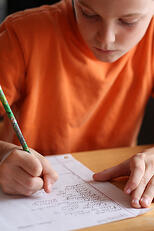In my work supporting gifted students, I see many high achieving children who make it to middle school, and  sometimes beyond, without exerting significant effort. Their cognitive abilities or remarkable memories put them in the highest reading and math groups, earn them advanced scores on standardized tests, and make completing homework packets a breeze. They often excel in afterschool activities as well, winning accolades from club leaders and top prizes in a wide spectrum of competitions. These same children might have Executive Function deficits such as cluttered desks, not being able to find their papers or materials, and perhaps they do all of their homework in a rush the night before it is due. But, who cares? They’re fine, right? Don’t mess with success.
sometimes beyond, without exerting significant effort. Their cognitive abilities or remarkable memories put them in the highest reading and math groups, earn them advanced scores on standardized tests, and make completing homework packets a breeze. They often excel in afterschool activities as well, winning accolades from club leaders and top prizes in a wide spectrum of competitions. These same children might have Executive Function deficits such as cluttered desks, not being able to find their papers or materials, and perhaps they do all of their homework in a rush the night before it is due. But, who cares? They’re fine, right? Don’t mess with success.
In their book To be Gifted & Learning Disabled, Drs. Susan Baum and Steven V. Owen identify another group of gifted students: those whose Executive Function deficits or other learning differences mask their high intellectual ability. The intellectual talents of these children enable them compensate for their challenges and perform at grade level.
According to Baum and Owen: “These students are difficult to spot because they are academically inconspicuous and do not grab attention with exceptional behaviors.”
Students, parents and teachers may scratch their heads, not understanding why a previously successful child would suddenly experience difficulty at school. Initial attempts to address the problem may fail because there’s an implicit assumption that gifted students can organize themselves, follow multistep directions, and work independently. (To learn more about myths surrounding gifted students, visit the National Association for Gifted Children’s website.)
Children’s self-esteem can plummet when they struggle to meet the increased expectations of middle school. Some blame themselves, and grow increasingly anxious that they are no longer “smart”. Students sometimes describe this experience as “crashing”.
If you have an adolescent in this situation, the remedy may be masked by past success. At the heart of the problem may be this simple fact: if school has never been hard, your child may never have developed effective organizational and study skills.
Good news: now that you know what’s wrong, you can address it together!
If you have a young child who achieves highly at school, here are some tips to prevent the crash:
Pay attention to the backpack, desk, paper flow, time management and materials. Don’t overlook areas in which they need support.
- Does your child’s written production lag behind other competencies? They might need instruction on using graphic organizers for problem solving or they might benefit from writing strategies for essay tests.
- If your child’s teacher sends the week’s homework in one packet, don’t do it all at once. Train your child to do a little work every day and do a good job on it. Avoid equating “fast” with “smart”.
- Watch the calendar. If there is a quiz, or a long-term project, encourage your child to start working early with active study strategies.
By developing the Executive Function skills that work for them early in their academic careers, students can avoid the crash and focus on forming friendships and developing their unique strengths and interests.
Paula Feynman is the Academic Challenge and Enrichment Support Program Manager for Cambridge Public Schools. For more information please visit their website and click on “Academic Challenge and Enrichment”.
photo credit:betsywatters via photopin cc
